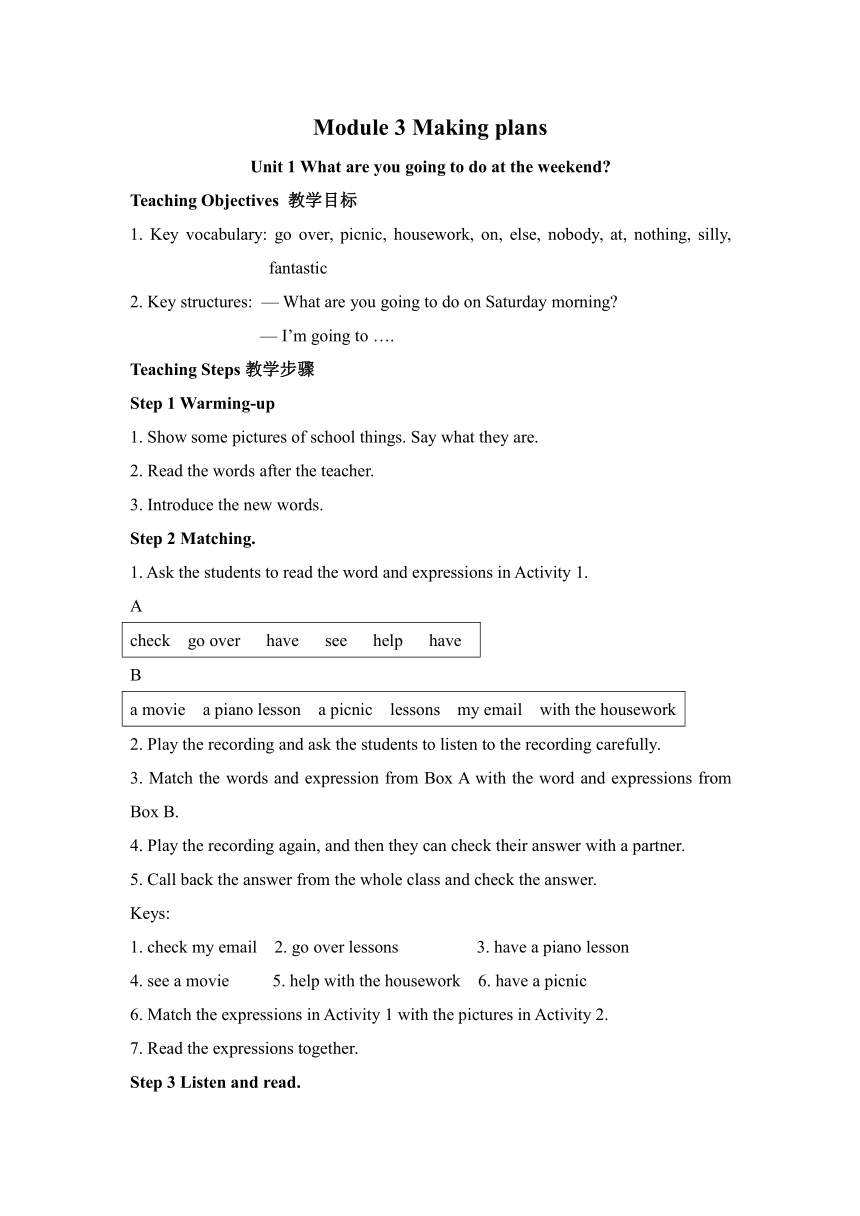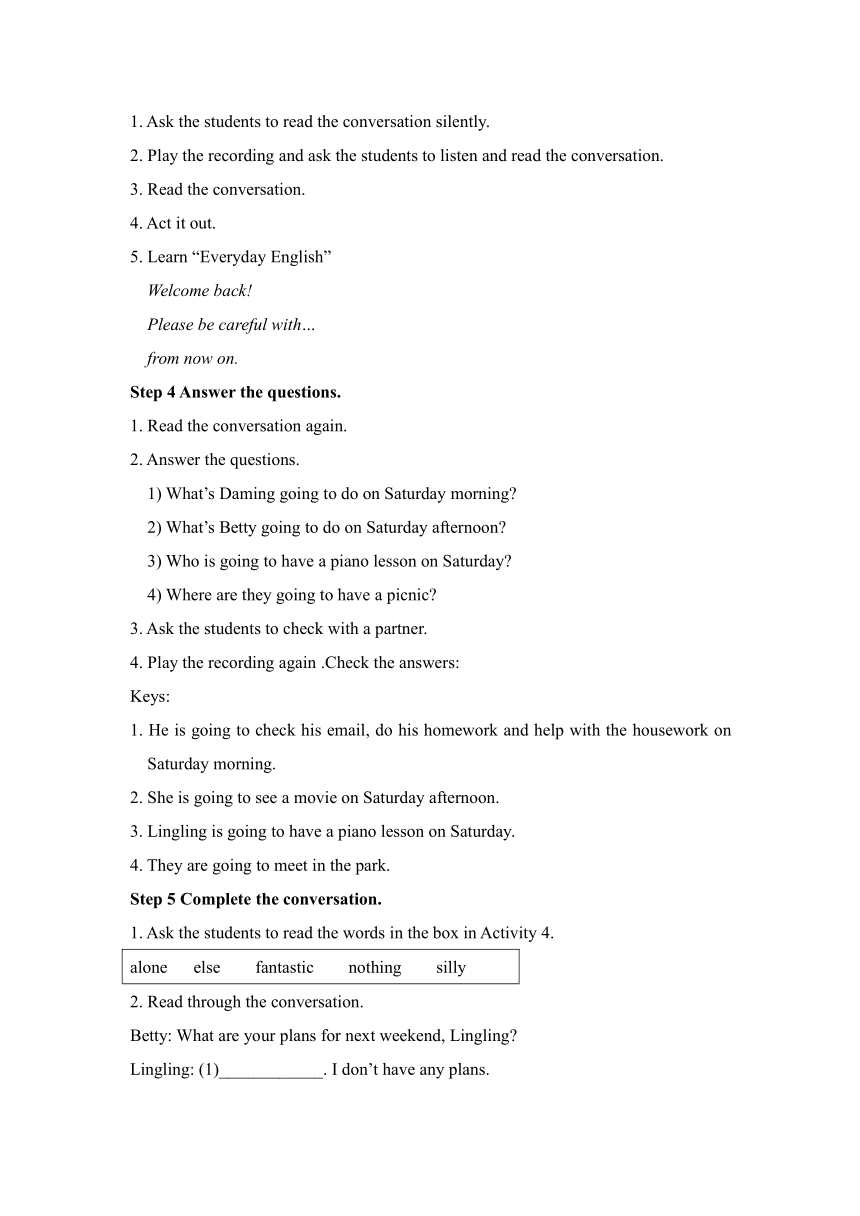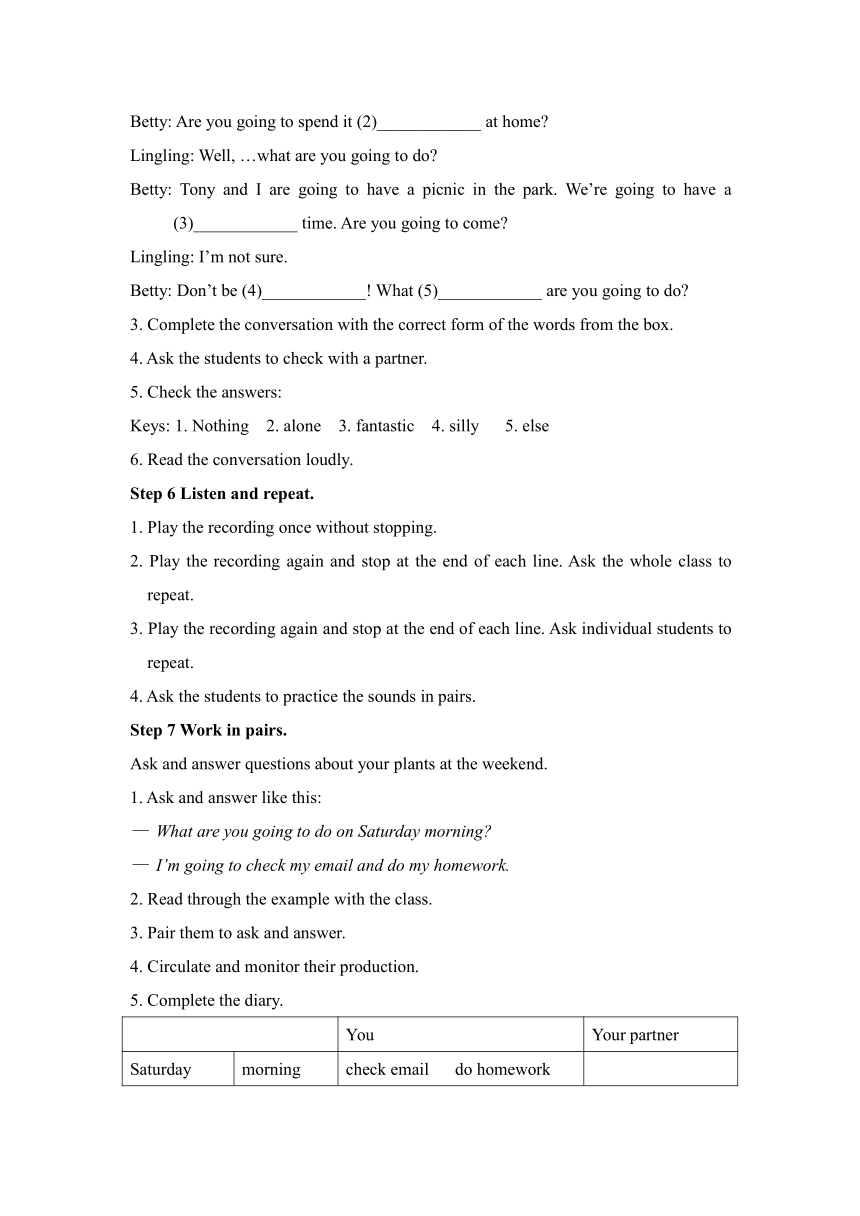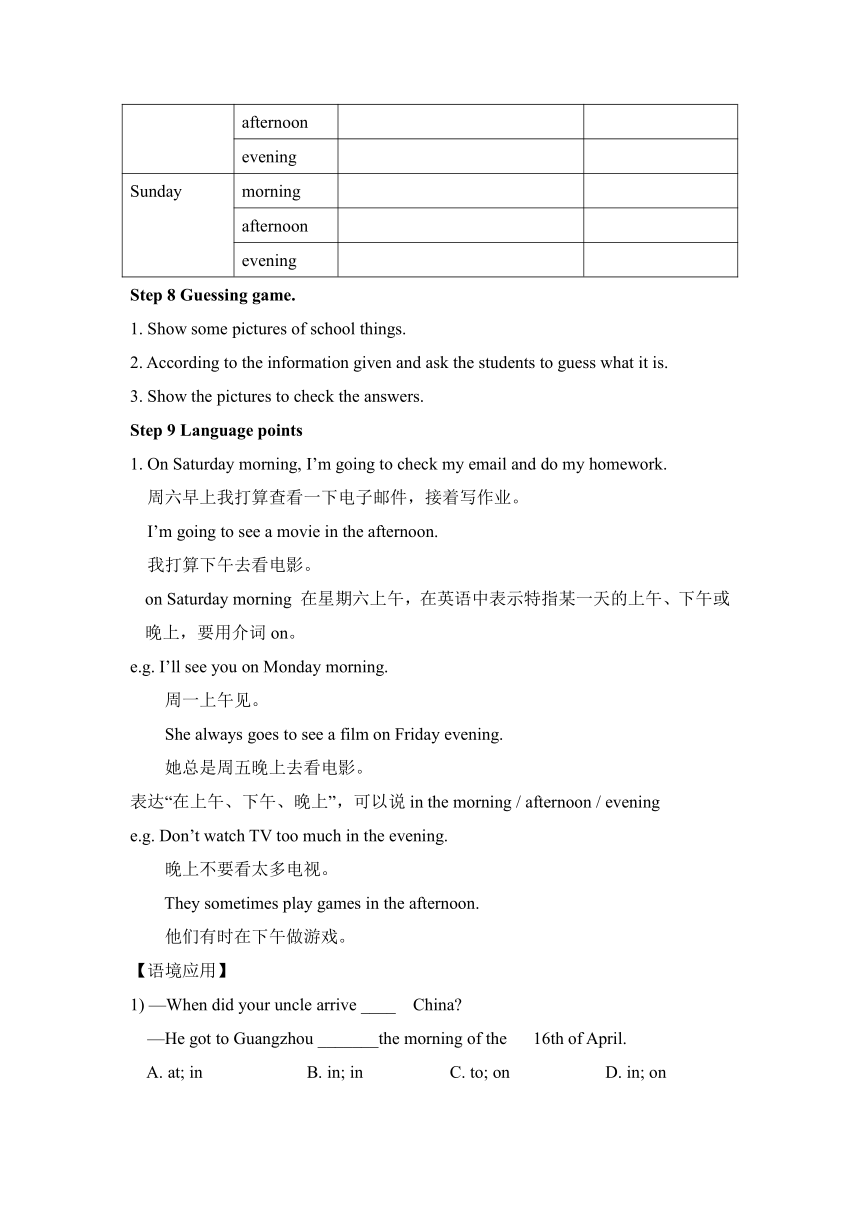Module 3 Unit 1 What are you going to do at the weekend 教案 2023-2024学年外研版英语七年级下册
文档属性
| 名称 | Module 3 Unit 1 What are you going to do at the weekend 教案 2023-2024学年外研版英语七年级下册 |

|
|
| 格式 | docx | ||
| 文件大小 | 19.7KB | ||
| 资源类型 | 教案 | ||
| 版本资源 | 外研版 | ||
| 科目 | 英语 | ||
| 更新时间 | 2024-02-22 08:23:45 | ||
图片预览




文档简介
Module 3 Making plans
Unit 1 What are you going to do at the weekend
Teaching Objectives 教学目标
1. Key vocabulary: go over, picnic, housework, on, else, nobody, at, nothing, silly, fantastic
2. Key structures: — What are you going to do on Saturday morning
— I’m going to ….
Teaching Steps教学步骤
Step 1 Warming-up
1. Show some pictures of school things. Say what they are.
2. Read the words after the teacher.
3. Introduce the new words.
Step 2 Matching.
1. Ask the students to read the word and expressions in Activity 1.
A
check go over have see help have
B
a movie a piano lesson a picnic lessons my email with the housework
2. Play the recording and ask the students to listen to the recording carefully.
3. Match the words and expression from Box A with the word and expressions from Box B.
4. Play the recording again, and then they can check their answer with a partner.
5. Call back the answer from the whole class and check the answer.
Keys:
1. check my email 2. go over lessons 3. have a piano lesson
4. see a movie 5. help with the housework 6. have a picnic
6. Match the expressions in Activity 1 with the pictures in Activity 2.
7. Read the expressions together.
Step 3 Listen and read.
1. Ask the students to read the conversation silently.
2. Play the recording and ask the students to listen and read the conversation.
3. Read the conversation.
4. Act it out.
5. Learn “Everyday English”
Welcome back!
Please be careful with…
from now on.
Step 4 Answer the questions.
1. Read the conversation again.
2. Answer the questions.
1) What’s Daming going to do on Saturday morning
2) What’s Betty going to do on Saturday afternoon
3) Who is going to have a piano lesson on Saturday
4) Where are they going to have a picnic
3. Ask the students to check with a partner.
4. Play the recording again .Check the answers:
Keys:
1. He is going to check his email, do his homework and help with the housework on Saturday morning.
2. She is going to see a movie on Saturday afternoon.
3. Lingling is going to have a piano lesson on Saturday.
4. They are going to meet in the park.
Step 5 Complete the conversation.
1. Ask the students to read the words in the box in Activity 4.
alone else fantastic nothing silly
2. Read through the conversation.
Betty: What are your plans for next weekend, Lingling
Lingling: (1)____________. I don’t have any plans.
Betty: Are you going to spend it (2)____________ at home
Lingling: Well, …what are you going to do
Betty: Tony and I are going to have a picnic in the park. We’re going to have a (3)____________ time. Are you going to come
Lingling: I’m not sure.
Betty: Don’t be (4)____________! What (5)____________ are you going to do
3. Complete the conversation with the correct form of the words from the box.
4. Ask the students to check with a partner.
5. Check the answers:
Keys: 1. Nothing 2. alone 3. fantastic 4. silly 5. else
6. Read the conversation loudly.
Step 6 Listen and repeat.
1. Play the recording once without stopping.
2. Play the recording again and stop at the end of each line. Ask the whole class to repeat.
3. Play the recording again and stop at the end of each line. Ask individual students to repeat.
4. Ask the students to practice the sounds in pairs.
Step 7 Work in pairs.
Ask and answer questions about your plants at the weekend.
1. Ask and answer like this:
— What are you going to do on Saturday morning
— I’m going to check my email and do my homework.
2. Read through the example with the class.
3. Pair them to ask and answer.
4. Circulate and monitor their production.
5. Complete the diary.
You Your partner
Saturday morning check email do homework
afternoon
evening
Sunday morning
afternoon
evening
Step 8 Guessing game.
1. Show some pictures of school things.
2. According to the information given and ask the students to guess what it is.
3. Show the pictures to check the answers.
Step 9 Language points
1. On Saturday morning, I’m going to check my email and do my homework.
周六早上我打算查看一下电子邮件,接着写作业。
I’m going to see a movie in the afternoon.
我打算下午去看电影。
on Saturday morning 在星期六上午,在英语中表示特指某一天的上午、下午或晚上,要用介词on。
e.g. I’ll see you on Monday morning.
周一上午见。
She always goes to see a film on Friday evening.
她总是周五晚上去看电影。
表达“在上午、下午、晚上”,可以说in the morning / afternoon / evening
e.g. Don’t watch TV too much in the evening.
晚上不要看太多电视。
They sometimes play games in the afternoon.
他们有时在下午做游戏。
【语境应用】
1) —When did your uncle arrive ____ China
—He got to Guangzhou _______the morning of the 16th of April.
A. at; in B. in; in C. to; on D. in; on
2) —When did the fire take place
—It took place _______ Sunday morning.
A.on B.at C.in D.of
Keys:1) D 2) A
2. Then I’m going to help with the housework.
接着我要帮忙做家务。
housework n. 家务
这是一个合成词。合成词是指由两个或多个词合成的一个新词,词与词中间有无连字符均可。
e.g. homework 家庭作业 blackboard 黑板
handwriting 书法 take-away 外卖食物
3. Who else is going to be there
谁还会一起去玩?
else adv. 其他;此外
可用于疑问代词或副词后,还可用于不定代词或副词后
e.g. What else did he say
他还说了些什么
Who else is coming
还有谁要来
4. Nobody.
nobody pron. 没人;没有人
它只能指人,不能指物;本身具有否定含义,相当于no one;作主语时,谓语动词一般用单数形式。
e.g. Nobody wants to go to school late.
没有人上学想迟到。
There is nobody in the classroom.
教室里没有人。
【语境应用】根据汉语意思完成英语句子,每空一词。
1) 操场上没有人。
There ______ ______ on the playground.
2) 没有人能够回答这个问题。
______ ______ ______ this question.
3) 约翰经常说谎,没人喜欢他。
John often tells lies and ______ ______ him.
Keys: 1)is nobody 2)Nobody can answer 3) nobody likes
5. Lingling and I are going to have a picnic.
我和玲玲要去野餐。
have a picnic 去野餐
在英语中,经常用have + n. 组成词组。
Have 短语
have a look at 看一看
have breakfast / lunch / supper 吃早/午/晚饭
have classes / lessons 上课
have a meeting 开会
have a rest 休息一会儿
6. Nothing. 没什么。
nothing pron. 没有什么;没有东西
在句中可以作主语,也可以作宾语。
e.g. Nothing is on the table.
桌子上什么也没有。
Nothing can make Tom feel happy.
没有什么能让汤姆感到快乐。
I know nothing about cooking.
我对烹饪一无所知。
【语境应用】将下列汉语句子翻译成英语。
1) 我们对他的家庭情况一无所知。
_________________________________________________
2) 箱子里什么也没有。
_________________________________________________
Keys: 1) We know nothing about his family.
2) There is nothing in the box.
7. Don’t be silly! 别傻了!
常见的否定祈使句有以下两种:
“Don’t+行为动词原形”和“Don’t +be+形容词”。
e.g. Don’t be afraid.
别害怕。
Don’t make friends with anyone like him.
不要和他这样的人交朋友。
Step 10 Summary
翻译下列短语:
1. 查电子邮件 ______________ 2. 复习功课 ________________
3. 上钢琴课 ________________ 4. 看电影 _________________
5. 帮助做家务 _______________ 6. 野炊 ____________________
Sentences:
1. I'm going to see a movie in the afternoon.
2. Who else is going to be there
3. Would you like to join us
4. Are we going to meet here
5. What are your plans for the weekend
6. Don't be silly!
7. It's going to be a fantastic weekend!
Keys:
1. check email 2. go over lessons 3. have a piano lesson
4. see a movie 5. help with the housework 6. have a picnic
Step 11 Do exercises:
Ⅰ. 根据语境及所给汉语提示语写出所缺单词。
1. There is ________(没有东西) in that pencil box.
2. —What do you think of the movie The Captain
—It’s ________(极好的).
3. ________(没有人) in my class can play the piano.
4. Don’t be ________(傻气的), Tony! We all love you.
5. Fu Fang often helps her mother with the ________(家务劳动).
Ⅱ. 根据汉语意思完成英语句子,每空一词。
1. 你还想要些什么?
________ ________ would you like
2. 咱们明天去野餐吧!
Let’s ________ ________ ________ tomorrow!
3. 他们正在那儿复习功课。
They are ________ ________ lessons over there.
4. 小明经常星期六下午打篮球。
Xiaoming often plays basketball ________ ________ ________.
5. 周末你打算去哪儿?
Where are you going ________ ________ ________
Step 12 Homework
Make your weekend plans.
Search for some information about how people in other countries spend their weekends
Unit 1 What are you going to do at the weekend
Teaching Objectives 教学目标
1. Key vocabulary: go over, picnic, housework, on, else, nobody, at, nothing, silly, fantastic
2. Key structures: — What are you going to do on Saturday morning
— I’m going to ….
Teaching Steps教学步骤
Step 1 Warming-up
1. Show some pictures of school things. Say what they are.
2. Read the words after the teacher.
3. Introduce the new words.
Step 2 Matching.
1. Ask the students to read the word and expressions in Activity 1.
A
check go over have see help have
B
a movie a piano lesson a picnic lessons my email with the housework
2. Play the recording and ask the students to listen to the recording carefully.
3. Match the words and expression from Box A with the word and expressions from Box B.
4. Play the recording again, and then they can check their answer with a partner.
5. Call back the answer from the whole class and check the answer.
Keys:
1. check my email 2. go over lessons 3. have a piano lesson
4. see a movie 5. help with the housework 6. have a picnic
6. Match the expressions in Activity 1 with the pictures in Activity 2.
7. Read the expressions together.
Step 3 Listen and read.
1. Ask the students to read the conversation silently.
2. Play the recording and ask the students to listen and read the conversation.
3. Read the conversation.
4. Act it out.
5. Learn “Everyday English”
Welcome back!
Please be careful with…
from now on.
Step 4 Answer the questions.
1. Read the conversation again.
2. Answer the questions.
1) What’s Daming going to do on Saturday morning
2) What’s Betty going to do on Saturday afternoon
3) Who is going to have a piano lesson on Saturday
4) Where are they going to have a picnic
3. Ask the students to check with a partner.
4. Play the recording again .Check the answers:
Keys:
1. He is going to check his email, do his homework and help with the housework on Saturday morning.
2. She is going to see a movie on Saturday afternoon.
3. Lingling is going to have a piano lesson on Saturday.
4. They are going to meet in the park.
Step 5 Complete the conversation.
1. Ask the students to read the words in the box in Activity 4.
alone else fantastic nothing silly
2. Read through the conversation.
Betty: What are your plans for next weekend, Lingling
Lingling: (1)____________. I don’t have any plans.
Betty: Are you going to spend it (2)____________ at home
Lingling: Well, …what are you going to do
Betty: Tony and I are going to have a picnic in the park. We’re going to have a (3)____________ time. Are you going to come
Lingling: I’m not sure.
Betty: Don’t be (4)____________! What (5)____________ are you going to do
3. Complete the conversation with the correct form of the words from the box.
4. Ask the students to check with a partner.
5. Check the answers:
Keys: 1. Nothing 2. alone 3. fantastic 4. silly 5. else
6. Read the conversation loudly.
Step 6 Listen and repeat.
1. Play the recording once without stopping.
2. Play the recording again and stop at the end of each line. Ask the whole class to repeat.
3. Play the recording again and stop at the end of each line. Ask individual students to repeat.
4. Ask the students to practice the sounds in pairs.
Step 7 Work in pairs.
Ask and answer questions about your plants at the weekend.
1. Ask and answer like this:
— What are you going to do on Saturday morning
— I’m going to check my email and do my homework.
2. Read through the example with the class.
3. Pair them to ask and answer.
4. Circulate and monitor their production.
5. Complete the diary.
You Your partner
Saturday morning check email do homework
afternoon
evening
Sunday morning
afternoon
evening
Step 8 Guessing game.
1. Show some pictures of school things.
2. According to the information given and ask the students to guess what it is.
3. Show the pictures to check the answers.
Step 9 Language points
1. On Saturday morning, I’m going to check my email and do my homework.
周六早上我打算查看一下电子邮件,接着写作业。
I’m going to see a movie in the afternoon.
我打算下午去看电影。
on Saturday morning 在星期六上午,在英语中表示特指某一天的上午、下午或晚上,要用介词on。
e.g. I’ll see you on Monday morning.
周一上午见。
She always goes to see a film on Friday evening.
她总是周五晚上去看电影。
表达“在上午、下午、晚上”,可以说in the morning / afternoon / evening
e.g. Don’t watch TV too much in the evening.
晚上不要看太多电视。
They sometimes play games in the afternoon.
他们有时在下午做游戏。
【语境应用】
1) —When did your uncle arrive ____ China
—He got to Guangzhou _______the morning of the 16th of April.
A. at; in B. in; in C. to; on D. in; on
2) —When did the fire take place
—It took place _______ Sunday morning.
A.on B.at C.in D.of
Keys:1) D 2) A
2. Then I’m going to help with the housework.
接着我要帮忙做家务。
housework n. 家务
这是一个合成词。合成词是指由两个或多个词合成的一个新词,词与词中间有无连字符均可。
e.g. homework 家庭作业 blackboard 黑板
handwriting 书法 take-away 外卖食物
3. Who else is going to be there
谁还会一起去玩?
else adv. 其他;此外
可用于疑问代词或副词后,还可用于不定代词或副词后
e.g. What else did he say
他还说了些什么
Who else is coming
还有谁要来
4. Nobody.
nobody pron. 没人;没有人
它只能指人,不能指物;本身具有否定含义,相当于no one;作主语时,谓语动词一般用单数形式。
e.g. Nobody wants to go to school late.
没有人上学想迟到。
There is nobody in the classroom.
教室里没有人。
【语境应用】根据汉语意思完成英语句子,每空一词。
1) 操场上没有人。
There ______ ______ on the playground.
2) 没有人能够回答这个问题。
______ ______ ______ this question.
3) 约翰经常说谎,没人喜欢他。
John often tells lies and ______ ______ him.
Keys: 1)is nobody 2)Nobody can answer 3) nobody likes
5. Lingling and I are going to have a picnic.
我和玲玲要去野餐。
have a picnic 去野餐
在英语中,经常用have + n. 组成词组。
Have 短语
have a look at 看一看
have breakfast / lunch / supper 吃早/午/晚饭
have classes / lessons 上课
have a meeting 开会
have a rest 休息一会儿
6. Nothing. 没什么。
nothing pron. 没有什么;没有东西
在句中可以作主语,也可以作宾语。
e.g. Nothing is on the table.
桌子上什么也没有。
Nothing can make Tom feel happy.
没有什么能让汤姆感到快乐。
I know nothing about cooking.
我对烹饪一无所知。
【语境应用】将下列汉语句子翻译成英语。
1) 我们对他的家庭情况一无所知。
_________________________________________________
2) 箱子里什么也没有。
_________________________________________________
Keys: 1) We know nothing about his family.
2) There is nothing in the box.
7. Don’t be silly! 别傻了!
常见的否定祈使句有以下两种:
“Don’t+行为动词原形”和“Don’t +be+形容词”。
e.g. Don’t be afraid.
别害怕。
Don’t make friends with anyone like him.
不要和他这样的人交朋友。
Step 10 Summary
翻译下列短语:
1. 查电子邮件 ______________ 2. 复习功课 ________________
3. 上钢琴课 ________________ 4. 看电影 _________________
5. 帮助做家务 _______________ 6. 野炊 ____________________
Sentences:
1. I'm going to see a movie in the afternoon.
2. Who else is going to be there
3. Would you like to join us
4. Are we going to meet here
5. What are your plans for the weekend
6. Don't be silly!
7. It's going to be a fantastic weekend!
Keys:
1. check email 2. go over lessons 3. have a piano lesson
4. see a movie 5. help with the housework 6. have a picnic
Step 11 Do exercises:
Ⅰ. 根据语境及所给汉语提示语写出所缺单词。
1. There is ________(没有东西) in that pencil box.
2. —What do you think of the movie The Captain
—It’s ________(极好的).
3. ________(没有人) in my class can play the piano.
4. Don’t be ________(傻气的), Tony! We all love you.
5. Fu Fang often helps her mother with the ________(家务劳动).
Ⅱ. 根据汉语意思完成英语句子,每空一词。
1. 你还想要些什么?
________ ________ would you like
2. 咱们明天去野餐吧!
Let’s ________ ________ ________ tomorrow!
3. 他们正在那儿复习功课。
They are ________ ________ lessons over there.
4. 小明经常星期六下午打篮球。
Xiaoming often plays basketball ________ ________ ________.
5. 周末你打算去哪儿?
Where are you going ________ ________ ________
Step 12 Homework
Make your weekend plans.
Search for some information about how people in other countries spend their weekends
同课章节目录
- Module 1 Lost and found
- Unit 1 Whose bag is this?
- Unit 2 Are they yours?
- Unit 3 Language in use
- Module 2 What can you do ?
- Unit 1 I can play the piano
- Unit 2 I can run really fast
- Unit 3 Language in use
- Module 3 Making plans
- Unit 1 What are you going to do at the weekends?
- Unit 2 We're going to cheer the players.
- Unit 3 Language in use
- Module 4 Life in the future
- Unit 1 Everyone will study at home
- Unit 2 Every family will have a small plane.
- Unit 3 Language in use
- Module 5 Shopping
- Unit 1 What can I do for you?
- Unit 2 You can buy everything on the Internet
- Unit 3 Language in use
- Module 6 Around town
- Unit 1 Could you tell me how to get to the Nationa
- Unit 2 The London Eye is on your right.
- Unit 3 Language in use
- Revision module A
- Module 7 My past life
- Unit 1 I was born in a small village.
- Unit 2 I was born in Quincy.
- Unit 3 Language in use
- Module 8 Story time
- Unit 1 Once upon a time….
- Unit 2 Goldilocks hurried out of the house.
- Unit 3 Language in use
- Module 9 Life history
- Unit 1 He left school and began work at the age of
- Unit 2 He decided to be an actor.
- Unit 3 Language in use
- Module 10 A holiday journey
- Unit 1 What did you do?
- Unit 2 This morning we took a walk.
- Unit 3 Language in use
- Module 11 Body language
- Unit 1 They touch noses!
- Unit 2 Here are some ways to welcome them.
- Unit 3 Language in use
- Module 12 Western music
- Unit 1 It's so beautiful!
- Unit 2 Vienna is the centre of European classical
- Unit 3 Language in use
- Revision module B
